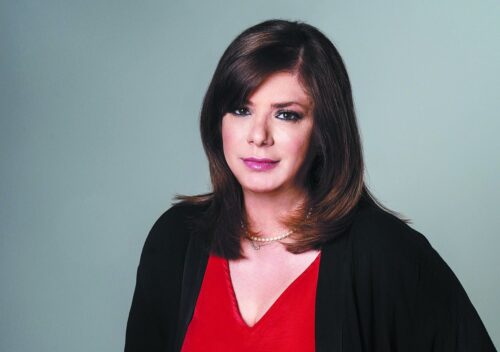
Vasia Panagopoulou is a prominent Greek actress known for her versatile performances in film and television. She has captivated audiences with her talent and charisma. Panagopoulou gained widespread recognition for her roles in popular Greek television series and films, showcasing her ability to portray a wide range of characters.
Her career spans over three decades, during which she has worked with renowned directors and collaborated with various esteemed actors. In addition to her acting prowess, Vasia is also recognized for her contributions to the arts and culture in Greece. With a strong presence in both dramatic and comedic roles, she continues to be a significant figure in the Greek entertainment industry, earning accolades for her performances and maintaining a loyal fan base.
As a child, did you dream of getting involved in theatre?
No, as a child, I never considered getting involved in theatre. When I was asked to go on stage during school celebrations, I trembled with fear.
How did you decide to study acting?
The decision to pursue acting came after high school when I had already enrolled in public law. It was an impulse of the moment that led me to take entrance exams for drama school.
How did your mother react when you told her you wanted to study acting instead of public law?
My mother was left speechless when I announced it. She didn’t expect it at all, especially living in a society like that of Mytilene.
What inspired you to pursue theatre instead of a more conventional career?
The challenge of the unknown and the discovery of a different world excited me and made me follow theatre.
How did your collaboration with director Giannis Dalianidis affect your career?
Giannis Dalianidis gave me my first role on television, which was very successful and led to many other opportunities. This collaboration solidified my decision to continue in the field of theatre and television.
Did you ever face difficulties or negative reactions from your colleagues due to your young age?
Yes, mainly from male colleagues who showed a tendency towards dominance and competition. However, over time, I discovered my strength and learned to claim what belongs to me.
Do you believe people should speak out when they experience any form of violence?
Yes, it is important for them to speak out and assert their dignity, even though Greek society may still be immature in protecting young people from such situations.
How have you tried to prepare your children to face life’s difficulties?
I have tried to explain to them that they need to learn to assert their self-respect and be able to stand strong on their own feet.
What was your experience working with theater director Andreas Voutsinas?
My collaboration with Andreas Voutsinas felt like opening a magical door and made me feel like a student again, offering me an entirely new world to discover.
How did you decide to get involved in translation and directing?
My involvement in translation began with the need to translate texts for others to understand. Directing arose when I disagreed with directors about their approach to works I loved, and I wanted to have an active role in creating them.
How do you handle the insecurities that an actor might feel?
Actors, like all artists, have insecurities, especially since they do not have stable jobs and are constantly exposed to criticism. However, they need to have the confidence to assert themselves and move forward.
You have made a dynamic return to television through the series “H Gi Tis Elias” (Land Of Olive Trees) in which you participate. How do you feel about being part of such a well-known and beloved series in Greek society?
I feel very good because first of all, I am collaborating again with Vana Dimitriou, who writes the script. We have worked together in the past, and I feel completely secure with the script. Also, the production team and my fellow actors are like a second family to me. I feel wonderful going back and forth between Athens and Cyprus and seeing people working with unity and enthusiasm.
How do you perceive the role of art in modern society, and what is your opinion on how theatre is treated in Greece?
It saddens me that in Greece people are not so close to theatre and that many Greeks do not have it in their daily lives. Theatre is a unique experience, a source of entertainment and education, but I believe we suffer from a lack of education and stimuli from school years. I hope that in the future Greeks will come closer to theatre.
What has been your most significant theatrical experience so far and why?
I highlight the performance “Electra” at the Northern Greece State Theatre with Andreas Voutsinas. It was a performance with a high degree of difficulty but also unique satisfaction for me as I felt acceptance from both the audience and my colleagues.
What message do you try to convey through your works, and how do you choose the productions you participate in?
If it’s up to me to choose, I’m interested in seeing if the play can speak to the soul of the Greek audience at this specific moment. This is the axis on which I move, and I think it’s important to choose works that can offer something positive to the audience.
What are your future plans? What would you like to do next?
On television, we have another season ahead for the series I’m participating in. I really enjoy this and feel the audience’s response. I’m also seriously considering returning to theatre, which I’ve already discussed with some colleagues. We are planning a theatrical performance that will start in Cyprus and come to Athens.